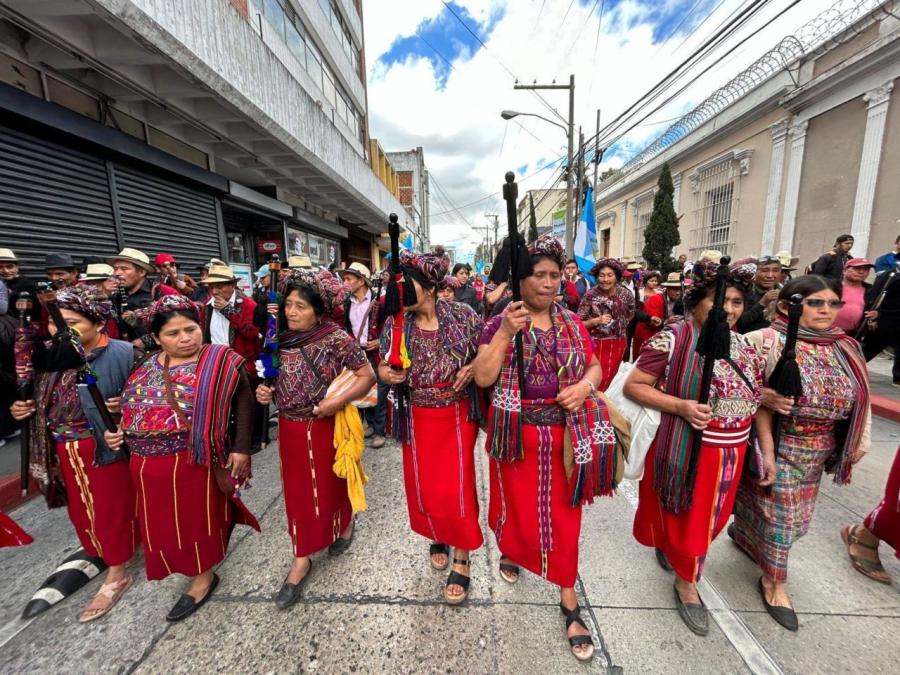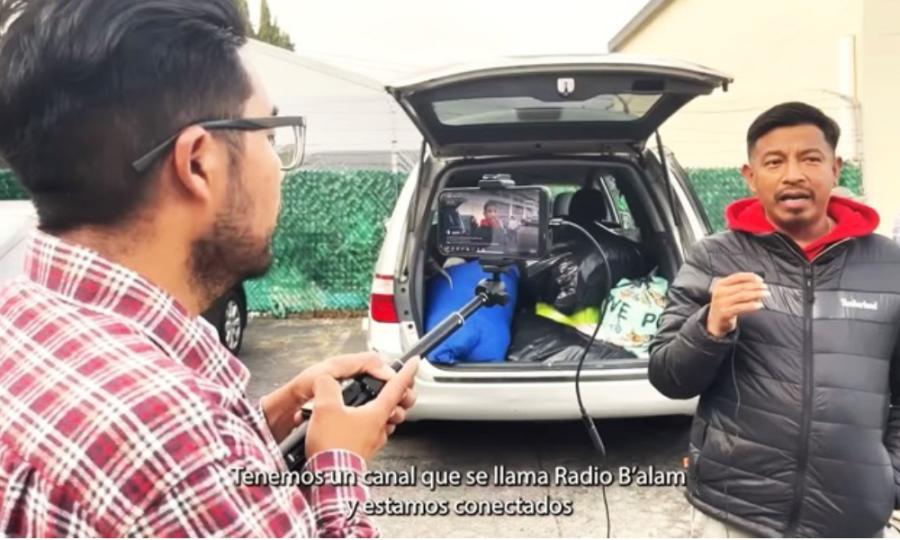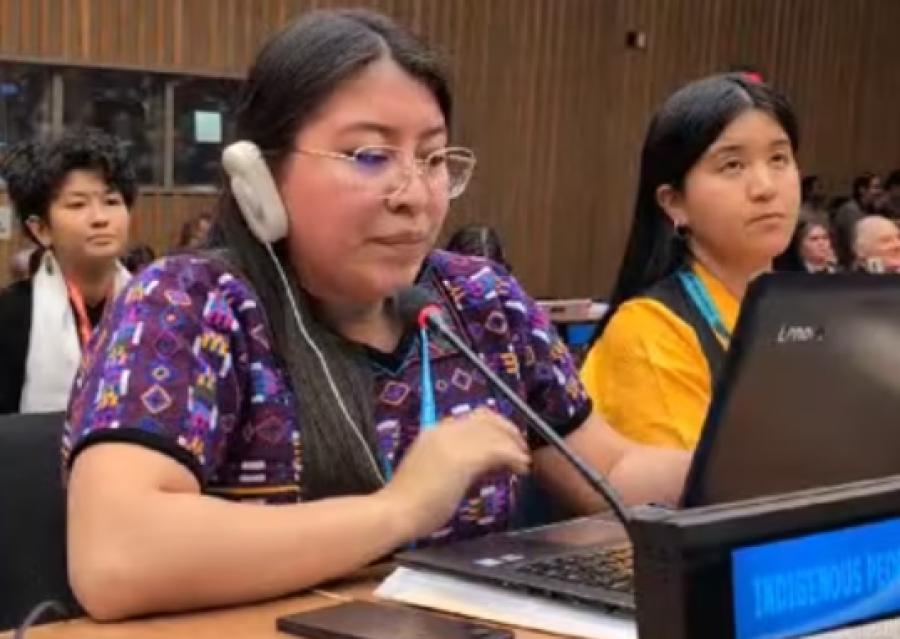
The survival of Indigenous Peoples’ heritage depends on their ability to assert equal civil rights, including the right to participate in decision-making processes. Some of the most pressing limitations faced by Indigenous people worldwide, including those in Guatemala, are linked to the protection and ownership of their lands, which are frequently and increasingly being usurped for purposes of mining, development, or other environmental exploitation.
Guatemala is a multi-ethnic country; along with the Xinca and Garifuna, there are 21 different Maya groups making up an estimated 51 percent of the national population and speaking 26 Mayan languages. There are dozens of Maya municipalities in the department of Quetzaltenango alone; this is the story of one, Cabrican.
Bibiana Ramirez is a Mam community leader from Cabrican. Her story begins when her community became aware that the government of Guatemala was authorizing licenses for mining companies in the area without consulting the local population. From this discovery arose an urgent need to start organizing and informing the community about the situation; a need to develop what she calls, lucha en defensa del territorio (fight to defend the territory). The community began organizing into several groups: teachers, youth, authorities, and ecclesiastic figures, each led by a representative. Their intention was to gather and discuss a possible process of consulta, or consultation. Ramirez explains consulta as the communities’ assertion of their right to participate in decision-making, as well as the act of voting for or against a project that would affect them. The goal of the group meetings was to inform the population about the advantages and disadvantages of the mining projects. Ramirez refers to this stage as the proceso de sensibilización, or the process of building awareness.
In total, 62 community consultas have been held throughout Guatemala. Ramirez says she was inspired by communities in Huehuetenango and San Marcos that had previously held similar consultations, including public forums for the community to vote for or against the initiative in question. However, unlike the others, her community decided to use paper ballots to create hard proof that the consultation had occurred. Out of a total population of approximately 25,000, more than half—13,610 people, a number that includes both children and adults—voted against the mining project slated for their lands. “It was a great turnout,” she recalls.
In spite of the popular mandate, due to various legal loopholes Guatemala insists that these consultas, which frequently result in communities rejecting mining and hydroelectric development projects, are not legally binding. Although it is obligated to conform to the right of Free, Prior and Informed Consent, the state claims that it lacks a legal framework to host consultations with communities. In the hopes of avoiding this roadblock, the community leaders in Cabrican presented a document summarizing their consulta to government officials in Quetzaltenango with the intent to obtain formal legal recognition of their consultation process. A delegation of 70 community leaders then traveled to the nation’s capital to present the documentation to the president and the minister in charge of approving the mining licenses.
When asked if she believes that Cabrican’s consulta was successful, Ramirez replied, “Not completely, since there are still mining companies coming and the current mining companies are only giving us 1 percent of their earnings.” She added, “the good thing is that we are defending our rights, our resources, and that we are not negotiating our lives.” Ramirez underscored that the community wants to protect its water resources; at various Canadian-owned mines in Guatemala, the use of arsenic to extract heavy metals (predominantly gold, silver, zinc, copper, and titanium) has contaminated local rivers and groundwater, making clean water scarce and leading to serious health repercussions for the local communities.
Within the Mam community there are eight municipalities, and so far seven have asserted their right to Free, Prior and Informed Consent by virtue of the consulta process. Representatives
from each of these municipalities (including Ramirez) have become part of Consejo de Pueblos del Occidente, or Western People’s Council, an organization that was created to defend Maya communities’ rights in the western region of the country. Following the consulta in Cabrican, several community leaders were invited to share their stories and experiences with Wayuu communities in Colombia and to assist and advise in the process of Free, Prior and Informed Consent as the Wayuu confront coal mining in Guajira.
On November 16–18, 2011, a workshop was presented to approximately 200 attendees from 41 different communities. Council members spoke of the obstacles they encountered during their own
consulta, including their learning processes around community organization, engagement, and empowerment. The presenters related stories of their protests against the government and
their ongoing work to defend their lands.
While the consulta process is invaluable, it can also be expensive. The consulta in Cabrican involved the mobilization of thousands of people, and Ramirez says it was difficult to obtain funding. The question of financing notwithstanding, she believes her community was successful because the people had clear information on their rights. Specifically, leaders were educated about their land rights and the laws that protected them. This knowledge in turn helped them educate the larger community about the dangers and consequences of mining and their rights as Indigenous people, and allowed them to inspire, gather, and organize people in the community to assert their own rights. In short, education empowered their leadership skills.
Ramirez also discussed the importance of the “power of voice,” leaders empowering and engaging people to take action. “They have to trust you,” she says. “The leaders have to believe in their rights and in themselves, and be able to convey a clear, inspiring message. We are talking about defending our rights to live. I always tell them, what future do you want to leave for your children?” Ramirez believes that her role is to motivate and inspire people; not to educate, but to emphasize something they have forgotten they possess.
Although there is still plenty of work to be done, the Mam communities have successfully stopped the provision of new mining licenses. Licenses previously issued for exploration in the department of Quetzaltenango have mostly been left to expire, with one exception: a GoldCorp subsidiary, Entre Mares, was issued a license for gold mining in Cabrican and two other municipalities in 2007 under the auspices of a project titled “ELUVIA.” Its development has been halted, for the moment, thanks to a petition filed by the municipality of Cabrican to the Department of Energy to have the license revoked. As the community waits for a final resolution, the people of Cabrican continue to work with the Western People’s Council to organize community leaders to carry out more consultations around Guatemala, asserting their rights for their lands and creating a future of their own making.
— Ana Lucía Fariña as part of her Masters in Environmental Leadership program at Naropa University in Boulder, Colorado, did her internship at Cultural Survival, researching Indigenous communities that had successfully asserted their rights to Free, Prior and Informed Consent.



